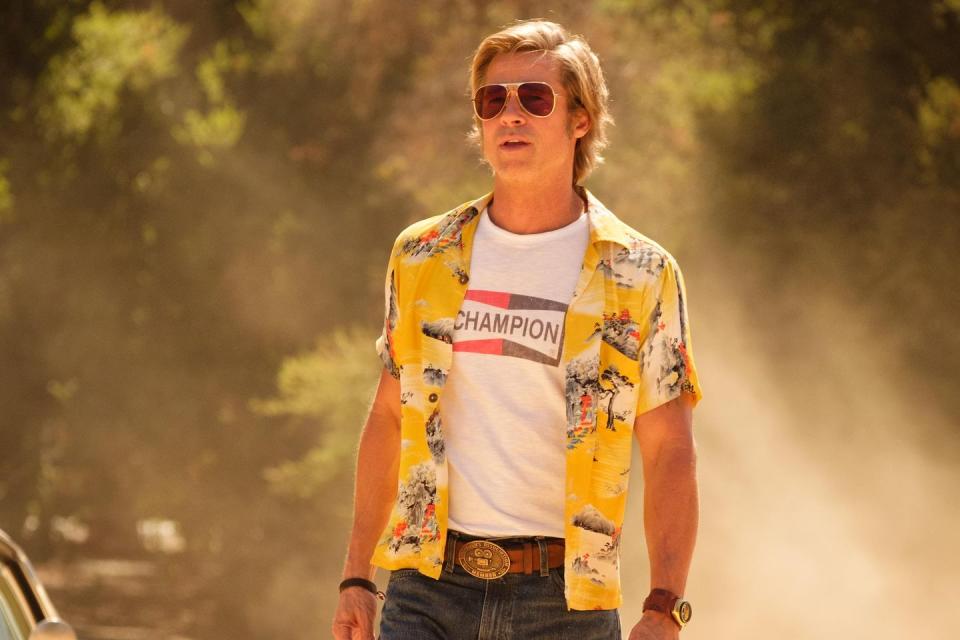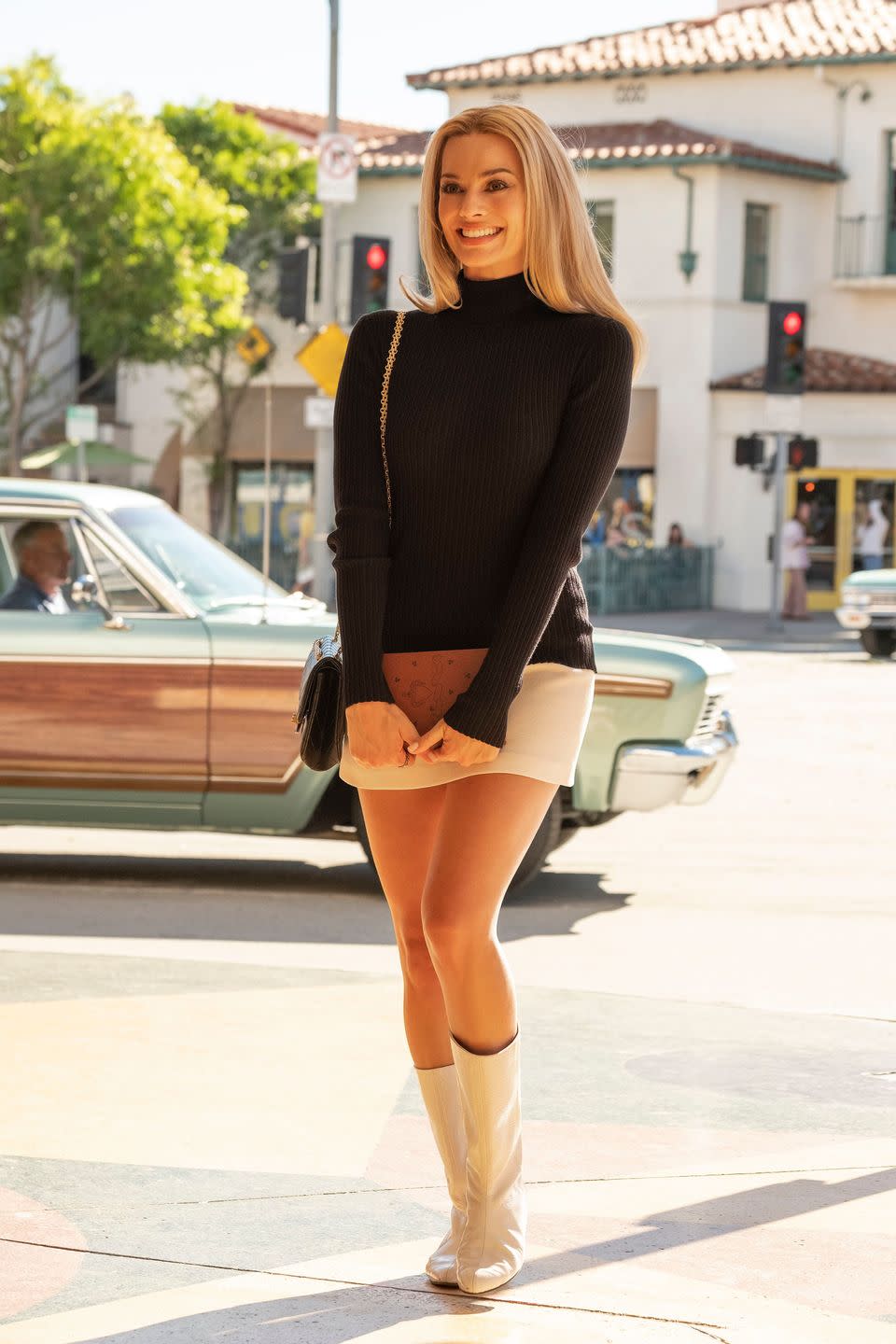'Once Upon a Time in Hollywood' Has Too Much Chauvinistic Baggage to Win Best Picture
This article is part of Esquire's Oscars series in which we consider if each Best Picture nominee at 2020 Academy Awards should or should not take home the night's highest honor. Read the rest of the Oscars series here.
There’s a brand of online observation that can be found in the comment section of any local news site—the righteous revenge fantasy. Someone like @FrankTurner30939 would like to see that Peeping Tom strung up by his thumbs. The mugger downtown wouldn’t know what hit him if he tried anything with @SpursFan2099. In Once Upon a Time in Hollywood, such comments meet their slick cinematic equivalent, a bloated piece of nostalgia porn that imagines what might have happened if someone had given those Manson hippies the old what-for. If the Academy knows any justice (and last year’s top pick is proof enough that it does not), Once Upon a Time won’t be awarded Best Picture on Sunday night.
Quentin Tarantino’s ninth film is without question the product of loving work by an expert craftsman, and it could very well win Best Picture, especially given the Academy’s fondness for doling out lifetime achievement awards (and movies about filmmaking itself). And superficially, Once Upon a Time achieves its goal of recreating a pivotal moment in Hollywood. But an era is built of more than clips from black and white television and a perfectly recreated vintage Los Angeles. History is made of people—and in failing to bring people to believable life, Tarantino fails the era he so clearly admires. Deprived of a taught storyline and humanistic characters, the film runs on an engine fueled by backwards-gazing chauvinism.
The movie tells the story of faded Western star Rick Dalton (Leonardo DiCaprio) and his best friend, stunt double, and aide-de-camp Cliff Booth (Brad Pitt) as they wring the last drops from their withering careers amid a changing late-’60s Hollywood landscape. Meanwhile, Dalton’s neighbors, actress Sharon Tate and her husband Roman Polanski, agents of the new order that would help consign the likes of Dalton to the ash heap of entertainment history, settle into lives of newlywed bliss and professional promise.
The movie has been deservedly criticized for its treatment of women and people of color, both of which should be Best Picture disqualifiers—but again, see Green Book. Among the very few non-white characters with speaking roles are a black guy at the airport who helps Tate and Polanski with their luggage, a Latino valet whose presence inspires Cliff to warn a weepy Rick not to “cry in front of the Mexicans,” and Mike Moh’s Bruce Lee, a buffoonish caricature of the legendary martial artist that’s been condemned by the real Lee’s family, friends, and biographer.
Contempt towards women is displayed in moments large and small, from the bone-crushingly bloody end that meets Manson’s acolytes in the film’s climax, to an almost throwaway flashback that suggests Cliff murdered his harping wife Natalie during a boating trip—a mean-spirited and completely unnecessary reference to the mysterious nautical death of West Side Story star Natalie Wood.
Margot Robbie’s often silent role as Sharon Tate was much discussed in the wake of the film’s release: Tarantino’s Tate dances from scene to scene, spinning, shaking and obligingly showing off her feet but hardly ever speaking. Similar criticism has also been lobbed at fellow Best Picture contender The Irishman, which found its leading woman Anna Paquin hardly speaking at all in her performance as Robert DeNiro’s daughter. But The Irishman is about the mafia, a perfect avatar of male chauvinism. There’s little similar justification for Tate’s beautiful, shimmying silence, especially given that before she died, the real Tate lamented that Hollywood had tried to make her “into a sex symbol, a blonde goose” with “shiny lips, rounded hips, and no brain.” (Yes, Tate’s family did approve of the film and her portrayal in it, and thankfully so. If only the Lee family could feel the same.)

Not only is Tate shown as something more like a nymph rather than a real human being, but the film’s history-defying ending, which finds Charles Manson’s minions dispatched by Cliff and Rick, reveals that she was not resurrected in service of her own memory and legacy. Rick outlines his hope early in the film that a friendship with his new neighbors might save his foundering career. “Here I am, flat on my ass, and who do I got living next door to me?” he asks Cliff. “Polanski, the hottest director in town right now, probably the world... I could be one pool party away from starring in a new Polanski movie.” The film ends with Tate and her friend Jay Sebring (played by Emile Hirsch in his first big-name movie role since his conviction for body slamming a woman and choking her into unconsciousness) opening the gates to 10050 Cielo Drive and inviting Rick into their warm and influential circle. It’s a fantasy, but not a fantasy of what Tate and Sebring’s young lives could have held. Tarantino brought back the dead so that Rick Dalton might end up at a pool party with Roman Polanski.
Aside from its grimy reveling in a time when men were men, women were decorative and non-whites were punchlines, the film often flatly fails as an artistic endeavor. Its first two thirds are tumescent with flashbacks that offer little more than amusingly faithful recreations of 1950s television styles, while its ending scurries along at breakneck pace with the sudden aid of intrusive narration. Yes, no detail is spared, yes, Tarantino’s eye for minutia is impressive. A flashback to a Dalton song-and-dance number is a near-perfect facsimile of a real-life 1965 TV moment. Irrelevant appearances by departed stars like Steve McQueen and Mama Cass are fun to watch. But there’s no depth, warmth, or much of a point to these resurrections. It’s trivia, with all the heart of an old episode of Jeopardy.

There are moments that harness this loyalty to the era and attention to detail in order to achieve something more transcendent, as in the quiet scene that finds Cliff returning home to his ramshackle trailer and assembling a dinner of boxed macaroni and cheese for himself and kibble for his well-trained and well-loved dog, Brandy. Robert Goulet sings “MacArthur Park” on the tiny television, just as he did in real life on February 8th, 1969. A jar of Cheez Whiz sits in the fridge. Brandi’s tail wags excitedly over a woven seat cover. For a moment, the details add up to a life, a home, a man, not cheap chuckles and clever nods. The moment ends.
Pitt and DiCaprio are a thrill to watch, which is neither a surprise nor an astonishing cinematic achievement. Beneath their impressive charms, the characters are thin. Rick vacillates from self-centered blubbering to blank doltishness; Cliff smirks with irresistible devilishness throughout. Neither is fully imbued with the spark of humanity. They’re there to fulfill a bloody home invasion vigilante fantasy.
Almost all film characters are utilitarian fictions. But this movie does so much—rewriting history, bringing back the dead—to accomplish so little. Its failings illustrate the ways in which tight budgets, judicious editors, and general restraint often help create the best art. Once Upon a Time doesn’t offer an intriguing vision of the woman whose life it saves, or conjure lead characters that are more than stereotypes of a childish actor and cowboy stuntman. It is an exercise in violent fancy, and the people at its heart don’t much matter. Just as the mugger and the Peeping Tom don’t truly matter to keyboard vengeance seekers, but a vision of a world in which might is right, and they are its all-powerful hero. Once Upon a Time in Hollywood gives a glimpse of this world, and it’s all as thin as paper.
You Might Also Like

